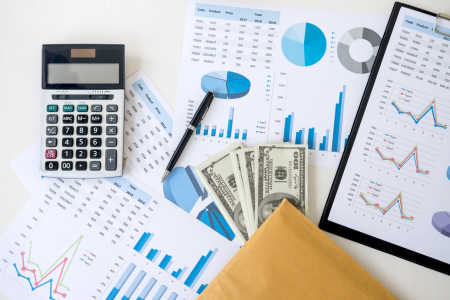Important Financial Terms You Should Know
As nurses, we deal with tons of medical abbreviations and terms on a daily basis – from IVs and MRIs to EKGs and every acronym in between. But when it comes to financial terms, things can get a bit fuzzy. And honestly, I totally get it. We spend years learning how to care for patients, but not a lot of time talking about APRs, APYs, or assets. Yet, understanding these terms can make a massive difference when it comes to managing our money and securing our future.
So, just like you’d break down a complex medical diagnosis for a patient, I want to break down these financial terms for you. No confusing jargon – just clear, simple explanations you can use to feel more confident navigating your financial life. Let’s get started!

1. APR (ANNUAL Percentage Rate)
APR is basically the cost of borrowing money over a year. Think of it like this: when you swipe your credit card for that Starbucks run before your shift, if you don’t pay off the balance in full, you’ll be charged interest. That interest is what the APR measures. The higher the APR, the more you’re paying to borrow that money. It’s like getting charged extra for something you already bought!
2. APY (Annual Percentage Yield)
APY is your friend when it comes to saving and investing. It’s a measure of how much your money will grow in a year, thanks to interest. The difference between APR and APY is that APY takes into account compounding interest – that’s when your money starts making money on itself. So, if you’ve got a savings account or investment, look for a higher APY. It’s like your money is clocking in and working extra shifts for you.
3. Assets
Assets are anything you own that has value. Assets can be your car, house, investments, or even your savings. Anything that can put money back into your pocket down the line. It’s important to know your assets because they contribute to your overall financial health.
4. Bonds
When you buy a bond, it’s like you’re lending money to someone (usually the government or a corporation), and they promise to pay it back with interest. It’s similar to loaning your friend $20 and them giving you back $25 next month. The good thing about bonds is that they’re usually pretty safe, which makes them a solid option for low risk-investing.
5. Capital Gains
Ever sell something for more than you paid? That’s a capital gain! Imagine you buy a house for $200,000 and later sell it for $250,000. That extra $50,000 is your capital gain. In investing, it’s the profit you make when you sell an asset for more than what you paid for it. And yes, you do have to pay taxes on capital gains, so keep that in mind.
6. Credit Report
Your credit report is like your financial health chart – it shows your credit history, similar to a patient’s medical history. The three main credit bureaus (Equifax, TransUnion, and Experian) keep track of how you’ve managed debt, like credit cards, loans, and even utilities. It’s important to check your credit report regularly to make sure everything is accurate.
7. Compound Interest
This one is a game-changer. Compound interest is interest that builds on itself over time – like snowballing. It’s when you earn interest not just on your initial savings but also on the interest you’ve already earned. It’s like if your savings account worked an extra shift for you while you were at home sleeping. Over time, this can really add up and help you grow your wealth.
8. Equity
Equity is the portion of an asset you truly own. Let’s say you’ve paid off part of your home – that amount is your equity. It’s like if you bought a fancy FIGS and paid off 50% of it. The part you own outright is your equity. With a home or business, the goal is to grow your equity over time, so you have more ownership and less debt.
9. Interest
Interest can be a bit of a double-edged sword. It’s the cost of borrowing money, like from a credit card or loan, but it’s also the reward for saving or investing money. For example, when you have a savings account, the bank pays you interest for keeping your money with them – kind of like a thank-you bonus for letting them use your cash.
10. Liability
Liabilities are the opposite of assets – they’re the debts or obligations you owe. Think of your student loans, car payment, or mortgage – these are all liabilities. Keeping track of your liabilities helps you assess your financial health.
11. Net worth
Net worth is like the big picture of your finances. It’s what’s left after subtracting all your liabilities from your assets. So, if you’ve got more assets than debts, you’re in good shape!
12. Principal
Principal refers to the original amount you borrow or invest. So, if you take out a $10,000 loan for school, that’s your principal. The interest you pay is on top of that. In investments, the principal is the starting amount you put in, and hopefully, it grows over time.
13. Required Minimum Distribution (RMD)
When you hit a certain age (usually 72), you’ll have to start taking money out of certain retirement accounts, whether you want to or not. This is called an RMD. It’s the government’s way of ensuring you use your retirement savings instead of letting it sit there forever.
14. Return
Return measures how much you make (or lose) on an investment. It’s like checking a patient’s progress after treatment – did the meds work? Did the surgery go well? Your return tells you how well your investment is doing over time.
15. Risk
Risk in finance is all about uncertainty. Just like there’s no guarantee every patient will respond perfectly to treatment, there’s no guarantee an investment will always give you the return you expect. The key is balancing risk with reward, knowing what you can afford to lose, and planning for the future.
16. Stock
Stock represents a share of ownership in a company. When you buy stock, you’re essentially becoming part-owner of that business. If the company does well, the value of your stock can go up.

Bottom Line
By becoming familiar with these terms, we, as nurses, enhance our financial literacy to make better-informed decisions. Let’s continue empowering ourselves to navigate the medical and financial world confidently and competently.


Pingback: 6 Advantages of Owning a Home That Will Change Your Perspective | Greener Scrubs
Pingback: Why You Need to Open a High-Yield Savings Account Today | Greener Scrubs
Pingback: What is a 401(k) and How Does it Work: A Complete Guide | Greener Scrubs
Pingback: Why You Need An Emergency Savings Fund: 5 Essential Reasons for Nurses | Greener Scrubs
Pingback: Why You Need to Open a High-Yield Savings Account Today | Greener Scrubs
Pingback: ETFs vs. Index Funds: The Secret Weapon to Growing Your Wealth | Greener Scrubs
Pingback: 7 Can't-Miss Advantages of Investing In A Roth IRA | Greener Scrubs
Pingback: An Easy Guide to the Basics of Investing for Nurses | Greener Scrubs
Pingback: 12 Reasons a Health Savings Account for Retirement is the Best Kept Secret | Greener Scrubs
Pingback: The Different Types of Investors: Which One Are You? | Greener Scrubs